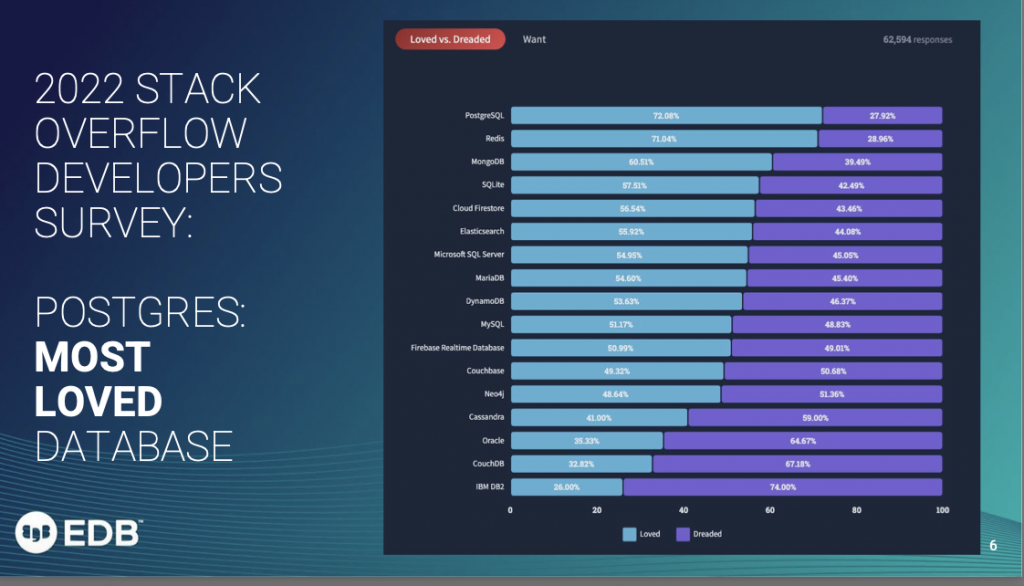Developers want to leave Oracle for Postgres.
Many companies are listening to their developers, and moving away from Oracle’s rising costs and lack of flexibility to a Postgres open source database that will modernize their stack and set them free.
But what exactly are developers looking for? Why is Postgres their database of choice? And even more importantly, what should you consider when embarking on a database migration?
EDB’s Senior Director of Product Marketing Bryan Turriff and Field CTO of Financial Services Julian Moffett answered these questions and many more in the first webinar of our Oracle Migration series. If you missed it, you can watch the on-demand recording here.
Here are some of the highlights:
Developers love Postgres
Turriff kicked off the webinar with the recent results from the 2022 Stack Overflow Developers Survey, which undeniably demonstrates that Postgres is a well-loved technology, and it’s only gaining momentum.
At EDB, we’re thrilled by this survey, because it shows developers feel the same way about Postgres as we do.

As shown above, developers surveyed by Stack Overflow voted Postgres the most loved database, overtaking Redis, which held this spot for the last five years. (Oracle is third from the bottom on the list. So, developers really prefer Postgres—Oracle, maybe not so much.)
This survey also shows that Postgres is developers’ most loved, most wanted and most used database. In fact, this year Postgres surpassed long-time leader MongoDB in the “most wanted” category to become #1.
What do developers want in an Oracle alternative?
- Open source first: Open source is increasingly popular in both the public and private sectors;.
- More choices in the cloud/more agile development options/Kubernetes: Developers want cloud options like hybrid, fully managed and more. They also demand agility, efficiency and flexibility;.
- Minimal application re-coding: No one wants to re-code their mission-critical applications for their new database;
- Postgres is the database developers grew up using: Many developers learned how to code using Postgres and are really comfortable with it.
How do I prepare for an Oracle-to-Postgres migration?
Over time, Moffett and Turriff learned that, while technical migration capability is very important, the non-technicals are equally important—if not more so. There are lots of options to reduce and exit your legacy database estate; but you need to invest time upfront to (1) determine and assess the readiness of your target platforms and (2) prepare your personnel for the process.
Here are a few things to think about before migrating:
- To reduce your Oracle legacy estate, think about application decommissioning and what you can turn off. More often than not, you’ll find that there are multiple copies of the database, particularly in dev environments where you don’t necessarily need them.
- When you’re looking to modernize apps, help your app teams by developing decision trees to map workloads to products and services.
- Don’t put an application on Postgres if it’s not the right fit. Accept that there will be applications that you can’t move to Postgres and develop plans to address these.
- Look into monitoring/alerting tools. You don’t want to get a call at 3 am on a Sunday night from your application team to tell you your database is going down. Being proactive pays.
- Get operational support in place. Let’s face it, you can build the shiniest, most beautiful car in the world, but without a driver, your car isn’t getting out of the garage. Do training exercises to get the right skills.
- Make sure to educate your consumers on your new platform and service offerings.
- Think about ways to incentivize your consumers to make migration appealing, whether it’s by passing on the lower cost benefits of open source, accelerating developer productivity or enabling database delivery in minutes instead of days or weeks.
How do I embark on an Oracle-to-Postgres migration?

What are my challenges?
- Getting buy-in with application teams
- Demonstrating the business case
- Aligning with the release cycles of application teams
- Having the support to react to the technical challenges that will arise
How do I address my challenges?
- Work with the appropriate stakeholders to set targets and objectives and timelines.
- Put together some business cases. You’re going to have to go through the exercise of understanding: “Yes, this is going to cost me money to get there. But how much will I save and how long before I see a ROI?”
- Metrics are really, really important, so make sure you’ve got some way of measuring your estate, particularly your Oracle estate or the growth of your Postgres estate. Set some targets to be able to demonstrate progress against them.
- Ensure people are aware of what the new platform’s about, and the capabilities you’ve got.
- See if there are other initiatives you can partner with to increase momentum and lessen the burden. Try to join forces with application modernization or a risk reduction exercise or other initiatives.
How can EDB help me?
As the leader in enterprise Postgres, EDB is far and away the biggest contributor to the Postgres open source project. More than 30% of the code contributed each year comes from EDB employees. We have over 200 software developers who develop in Postgres and who are developing for Postgres.
With the EDB Migration portal, full-circle protection support plans and a range of other solutions and services, we’ve helped businesses of all sizes shed the shackles of Oracle and experience the full power of Postgres—both on-prem and in the cloud.
Your Postgres journey is just beginning
In our next Oracle Migration blog article, we’ll recap the tools, capabilities and resources that make Oracle-to-Postgres database migrations easier.
It goes without saying that developers will love it.
